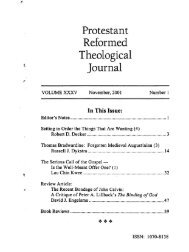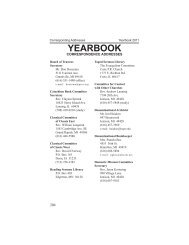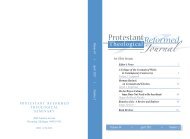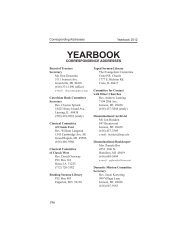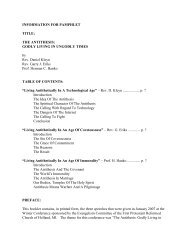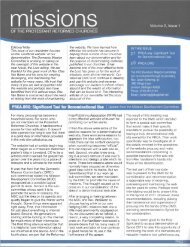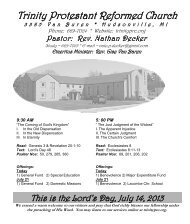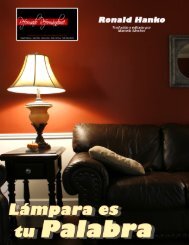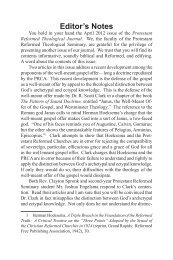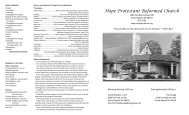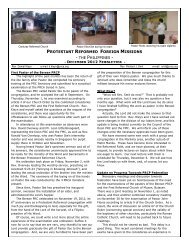November 2007 - Protestant Reformed Churches in America
November 2007 - Protestant Reformed Churches in America
November 2007 - Protestant Reformed Churches in America
You also want an ePaper? Increase the reach of your titles
YUMPU automatically turns print PDFs into web optimized ePapers that Google loves.
(Henry)—whose objective<br />
content human know<strong>in</strong>g subjects<br />
then process <strong>in</strong>tellectually.<br />
Its epistemic primacy<br />
stems rather from its nature as<br />
the church’s authoritative<br />
script [note that word “script,”<br />
RC], the normative specification<br />
for <strong>in</strong>terpret<strong>in</strong>g what God<br />
is say<strong>in</strong>g and do<strong>in</strong>g <strong>in</strong> creation,<br />
<strong>in</strong> the history of Israel,<br />
and <strong>in</strong> Jesus Christ. It is a<br />
mistake to abstract Scripture<br />
from the drama of redemption<br />
and treat it as an autonomous<br />
holy object. Scripture is correctly<br />
grasped only when<br />
viewed sub specie theodramatis,<br />
that is, <strong>in</strong> relation to<br />
the events it recounts, displays<br />
and enjo<strong>in</strong>s (p. 167).<br />
… we speak not of propositional<br />
but prepositional theology.<br />
In particular, everyth<strong>in</strong>g<br />
h<strong>in</strong>ges on how we parse the<br />
Spirit’s speak<strong>in</strong>g, us<strong>in</strong>g the<br />
prepositions “<strong>in</strong> and through”<br />
the Scriptures (p. 169).<br />
There ought to be little doubt<br />
that Vanhoozer’s view of Scripture<br />
diverges from the classic<br />
and confessionally <strong>Reformed</strong><br />
view of Scripture.<br />
Second, what makes this<br />
divergence clear is Vanhoozer’s<br />
<strong>in</strong>sistence that Scripture is<br />
“multiperspectival” (pp. 178 ff.)<br />
and his designation of Scripture<br />
Book Reviews<br />
as a “script,” the “script” <strong>in</strong> the<br />
“theodrama” (pp. 173 ff.). This<br />
is not only a deficient description<br />
of Scripture, but an altogether<br />
erroneous description.<br />
For a script is a dead th<strong>in</strong>g, <strong>in</strong><br />
itself. It is not the script that is<br />
<strong>in</strong>tended to be revelatory, but<br />
the act<strong>in</strong>g out of the script. And<br />
because it is only a script, it may<br />
be changed by the actors under<br />
the <strong>in</strong>spiration of the moment.<br />
Whether they follow the script<br />
or not is not, after all, so very<br />
important.<br />
And, third, Vanhoozer is <strong>in</strong>fected<br />
with the false teach<strong>in</strong>g of<br />
the pluriformity of the church.<br />
Just as it takes four Gospels<br />
to tell the story of Jesus Christ,<br />
so it takes many <strong>in</strong>terpretative<br />
communities and traditions<br />
fully to understand the Gospels<br />
(and the rest of Scripture).<br />
The church comes to a<br />
fuller understand<strong>in</strong>g of its authoritative<br />
script to see what<br />
other local churches have<br />
made of it. In short, a<br />
Christologically centred and<br />
canonically bounded polyphonic<br />
tradition that <strong>in</strong>cludes<br />
Western and non-Western, ancient<br />
and contemporary<br />
voices best corresponds to the<br />
nature of the Scriptures themselves<br />
(p. 180).<br />
<strong>November</strong> <strong>2007</strong> 115



